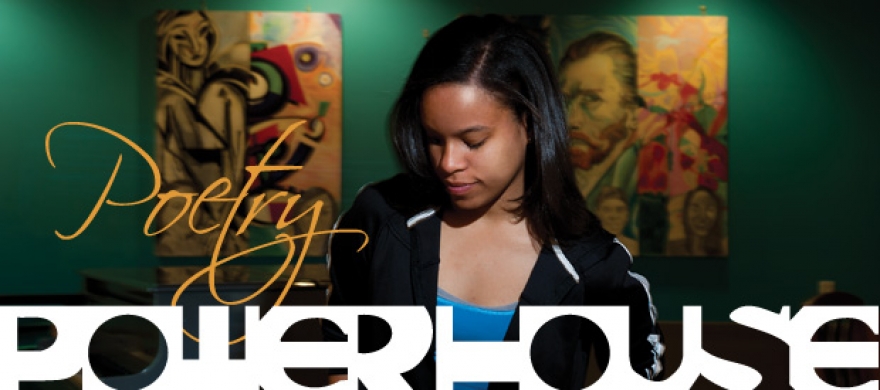Poetry Powerhouse
Sophomore Demi McCoy’s lyrical talent and faith come alive as she stages performance poetry around campus and online.
Watch Demi McCoy in action at the 2012 Pepperdine Associates Dinner »
Demi McCoy’s friends are often shocked when they see her Malibu dorm room. The young spoken-word poet refuses to embellish her walls with art or decorations—an interesting choice for a student who is known and admired on campus for her artistry.
“I love art, but it helps me to think,” she explains, of her bare walls. “It helps when you look around to not have anything that’s manipulating your thoughts; that’s why I like to just have the white walls. It gives way to a lot of thoughts.”
The sophomore religion major is softspoken and thoughtful in conversation, exuding an outer calm that is reflected in the tranquility of her dorm-room style. But the serene exterior of both her white walls and personal mannerisms stands in sharp contrast to who she becomeson stage: a solo powerhouse, armed with just a self-composed poem about faith or love or society and a persuasive voice, capable of commanding an entire auditorium of listeners to silence.
Her pieces are usually faith-driven or socially conscious calls to action, and when she steps onto a stage she dresses casually, typically in jeans, symbolizing the personable and intimate subject matter to follow. The poem “The Drought,” performed at a student coffeehouse last year, highlights the extreme poverty suffered around the world as an implicit call to action.
Yet still we leave them alone, as if this were about us
Meanwhile they barely have a home bigger than our bathroom
Running water does not exist
So a woman's daily routine consists
of a four mile hike
to carry water back overnight
And as she lifts the jug over head
We lay in our beds
Not even consciously aware of how lucky we are
- An excerpt from "The Drought" by Demi McCoy
“I try to be as honest as possible, because as long as I’m honest then there’s some part of me that’s going to connect with another human being, because we all go through the same emotions,” she says. Her favorite piece, titled “Your Reflection,” touches on self image in the modern world.
“It’s one of my more fun pieces, because I play around with so many different words. It also talks about how people can see this image of themselves in the mirror that they’ve created but it might not necessarily speak true to who they are. It’s fitting for a lot of people.”
Despite the historical roots of spoken poetry—from the oral distribution of Homer’s Iliad and Odyssey two millennia ago to the popular bourgeois poetry readings of the 19th century—spoken word in its current tradition remains somewhat under the radar. McCoy herself had not dabbled in this form of expression until recently, preferring either to write or sing before performing spoken word for the first time at the student group D.R.E.A.M.’s talent show in October 2010.
Following that first foray into performance poetry, she continued to showcase her work throughout her freshman year at a variety of multicultural and open-mic events; especially notable about her 2011 schedule was the high number of faithbased performances at Pepperdine. A quick survey of her videoed performances and written poetry online reveals how Demi explores her faith with depth and passion in her work.“Through the gift of spoken word I kind of found my faith,” reveals McCoy, who plans to further her theology studies at a postgraduate level. “Because most of my earlier poems were about my life, my problems, a lot of it was really just self-centered.
It wasn’t until people started telling me I had this gift for poetry that I decided to explore that aspect of my life.”Today she is in high demand at Pepperdine events, and after jumping into performance poetry headfirst just a little more than one year ago, she’s developed a system of preparation for each nerve-wracking performance. Before she even begins writing a piece, she spends a few weeks or months thinking about its intended message, and once it is written she rehearses as far in advance as possible to become comfortable with it.
“And then I pray before each of my performances, to help me to remember why I’m performing, what the purpose is for—that it’s not really for me. And that takes the burden off me. Because, at the end of the day, it’s all for Him.”
